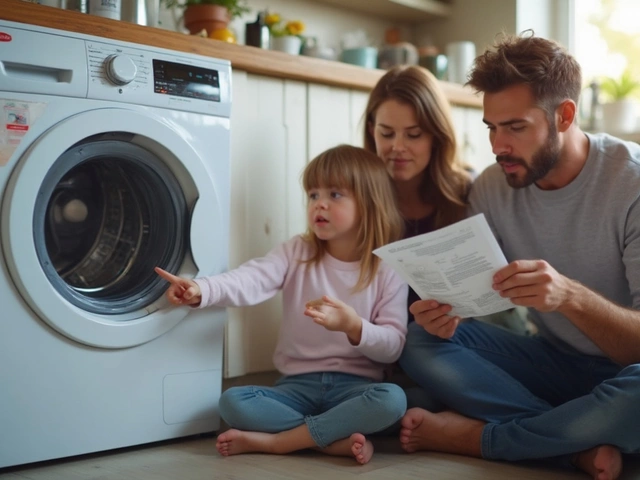An appliance technician plays a crucial role in making sure your home appliances work like a charm. Think of them as the skilled wizard who can breathe life back into your stubborn washing machine or that pesky refrigerator that refuses to cool. Their job isn't just about fixing things—it's about diagnosing issues and recommending the best solutions to keep everything running smoothly.
A good appliance technician comes equipped with an arsenal of tools and a sharp mind for troubleshooting. Whether it's a quirky sound or a complete breakdown, they know how to pinpoint problems with precision. This skill set isn't just about fixing; it's also about understanding the nuances of different appliance brands and models, which can vary more than you might think.
- The Daily Duties of an Appliance Technician
- Essential Skills and Qualities
- Training and Certification Pathways
- Finding a Reliable Appliance Technician
- Latest Trends in Appliance Repair
- Helpful Tips for DIY Enthusiasts
The Daily Duties of an Appliance Technician
An appliance technician is a jack-of-all-trades when it comes to ensuring your household machines aren’t just sitting pretty but are up and running efficiently. They dive headfirst into diagnosing and fixing any issues that may arise. Their day might start with a simple repair of a coffee maker that refuses to brew and end with tackling a more complex problem in an upscale smart refrigerator.
Diagnosing Issues
One of the first steps in their daily grind is diagnosing appliance problems. They use a mix of technical know-how and detective skills to get to the bottom of issues. Got a dryer that won't heat? An appliance technician will first rule out obvious culprits like a blown fuse or a clogged vent before moving on to more intricate components.
Repairing and Replacing Parts
Once the issue is pinpointed, the next step involves repairing or replacing parts. Appliance technicians carry a toolbox filled with common spare parts, making quick work of broken belts, faulty thermostats, or damaged gaskets.
Routine Maintenance
Technicians also perform routine maintenance. Just like a car, appliances need regular check-ups to prolong their life. They clean filters, lubricate moving parts, and ensure everything is aligned correctly to prevent future breakdowns.
- Appliance Repair: They often spend a good chunk of their day on site, tackling problems directly at clients' homes.
- Inventory Management: Keeping track of necessary parts and tools is key. Technicians update their inventory to ensure they're always ready for the next challenge.
- Customer Consultation: They also play the role of a consultant, advising customers on whether it's more cost-effective to repair an appliance or invest in a new one.
Technology Updates
In today's tech-driven world, keeping up with the latest in appliance technology is also crucial. With smart appliances becoming more common, technicians need to stay sharp, ensuring they can handle any digital diagnostics or software updates needed.
Essential Skills and Qualities
Being an appliance technician is no walk in the park. The job requires a mix of technical know-how, problem-solving skills, and a good dose of patience. Let's break down some of the must-have skills and qualities that can make or break a technician in this field.
Strong Technical Skills
A solid grasp of how appliances function is crucial. Technicians should be familiar with the inner workings of different gadgets, from refrigerators to microwaves. It's not just about knowing what buttons to push—it's about understanding the science behind the operation.
Problem-Solving Ability
Every day on the job presents unique challenges. A technician must dissect problems, identify the root causes, and implement effective solutions. It's a bit like being a detective for appliances.
Customer Service
An appliance technician often works directly in clients' homes, which means good communication skills are essential. Being friendly, patient, and able to explain the problem and solution in layman's terms can set a technician apart.
Physical Dexterity
Let's face it: Some appliances are heavy and awkward. A technician often needs to maneuver bulky items, which requires a fair amount of physical fitness and dexterity.
Attention to Detail
Missing a small component issue or failing to follow through with a fix can lead to more significant problems. Technicians need to be detail-oriented to ensure every step of the repair is correctly executed.
Training and Experience
Many technicians pursue vocational training or apprenticeships to gain practical experience. Continued learning is essential as technology evolves, so staying updated with new appliance models and repair techniques is part of the job.
Certifications and Licenses
While not always mandatory, certifications from reputable industry organizations, such as the Professional Service Association, can boost credibility and open more job opportunities. Some regions might also require specific licenses.
Training and Certification Pathways
Becoming a skilled appliance technician isn't just about having a knack for fixing stuff. It involves proper training and sometimes getting certified. Sure, some folks might start with on-the-job experience, but having formal education under your belt can give you a big leg up in this field.
Many community colleges and technical schools offer programs specifically geared towards appliance repair. These courses usually cover essential topics like electronics, gas systems, and refrigeration—pretty much everything an aspiring technician needs to know. Most programs balance classroom learning with hands-on training, so you get to practice what you learn in real-world scenarios.
Getting Certified
While it might not be legally required to hold a certification in appliance repair, it can definitely open doors. Certifications from programs like the Professional Service Association (PSA) or the National Appliance Service Technician Certification (NASTeC) show potential employers or clients that you know your stuff. It's kind of like a trust badge—reassuring them that you won't accidentally worsen things!
"Certification can be a differentiator for technicians stepping into a saturated job market," says Harvey Rosenbloom, editor of the Appliance Tech Monthly. "It signals commitment to the trade and a thirst for ongoing learning."
For those aiming to work with specific brands, manufacturer-specific training is also an option. Major appliance manufacturers often offer specialized courses to train technicians on their specific products. This is particularly valuable if you're looking to specialize, as it can make you a go-to expert.
DIY Learning Opportunities
Interestingly, the world of appliance repair is ripe with DIY learning opportunities too. Online resources, forums, and even YouTube channels cater to novices and seasoned pros alike. They dive into everything from basic diagnostics to complex repair tricks, often shared by experienced technicians eager to pass on their wisdom.
The Bottom Line
When weighing your options, think about what best suits your goals—whether it's formal education, certification, or even self-study. A mix of these could be ideal, giving you both the credentials and the hands-on expertise needed in this ever-evolving industry.

Finding a Reliable Appliance Technician
So, your fridge is acting up again, and you're thinking it’s time to call in the big guns. How do you make sure you’re getting someone who knows what they’re doing? Finding a reliable appliance technician doesn’t have to be a shot in the dark.
Do Your Homework
Start by checking online reviews. Websites like Yelp or Google Reviews can give you honest insights into other folks' experiences. Look for consistent positive feedback and keep an eye out for any red flags like missed appointments or shoddy work.
Ask For Recommendations
Got friends or neighbors who recently got something fixed? Ask them. Personal recommendations are gold, giving you real-life proof that this appliance repair pro knows their stuff.
Check Credentials
Not all technicians are created equal. Make sure they’re certified for the specific appliance type. This isn’t just about brand familiarity but also understanding the latest tech advancements. A certified appliance technician won't mind sharing proof of their qualifications.
Compare Estimates
Get quotes from at least three technicians. It’s not just about finding the cheapest option; it’s about understanding what each provides. Pay attention to details like warranty, parts covered, and labor costs.
Questions to Ask
- What is your experience with this specific appliance?
- Do you offer a warranty on repairs?
- How soon can you schedule an appointment?
- What are your payment options?
By asking the right questions and doing a bit of research, you can make a choice that'll keep your home devices ticking along smoothly.
Latest Trends in Appliance Repair
The world of appliance repair isn’t stuck in the past. It's evolving just like the tech industry, and keeping up with the latest trends can help both technicians and homeowners stay ahead of the game. One of the biggest shifts we’re seeing is the growing integration of smart technology in household devices. Remember when you used to have to manually set your dishwasher? Now, it's all about connecting to Wi-Fi and managing everything through your phone.
For an appliance technician, this means staying updated on software troubleshooting along with hardware repairs. Familiarity with app interfaces, connectivity issues, and firmware updates is becoming crucial. A technician who knows their way around a smartphone not only diagnoses physical issues but also addresses connectivity problems—think tackling network drop-offs in smart fridges.
Green Solutions and Sustainability
Environmentally friendly appliances are on the rise. More consumers are opting for energy-efficient models, so technicians need to understand how these systems work differently from traditional appliances. This might mean getting to grips with new repair parts or techniques that reduce environmental impact.
Data and Diagnostic Tools
In terms of diagnostics, advanced tools are becoming more prevalent. High-tech scanners and diagnostic apps mean problems can be spotted with more accuracy and speed. This reduces the guesswork and often cuts down on repair time, which is a win-win for both the technician and the homeowner.
Below is a glimpse into some of the diagnostic tools making waves:
| Tool | Purpose |
|---|---|
| Smart Diagnostic Scanner | Pinpoints specific issues using machine learning. |
| Thermal Imaging Cameras | Helps in detecting heat signatures for electronics. |
Staying current on these latest trends not only increases a technician’s value but also boosts customer satisfaction. As appliances get smarter and greener, technicians who embrace these changes can offer better services and stay ahead in the appliance repair field.
Helpful Tips for DIY Enthusiasts
Feeling adventurous and want to tackle some appliance issues on your own? Going the DIY route can not only save you some cash but also give you a sense of accomplishment. However, it’s important to know your boundaries and when to call in a professional appliance technician. Here are some tips and tricks to keep you from getting in over your head.
Start with the Basics
Sometimes the problem is simpler than you think. Before making any assumptions, make sure you check the basics: is the appliance plugged in? Is it switched on? Have you tripped a circuit breaker? These steps sound obvious, but you'd be amazed at how often they’re overlooked. If it’s a smaller appliance, try unplugging it for a few minutes. This can sometimes reset any stubborn faults.
Get to Know Your Tools
Arm yourself with essential tools like screwdrivers, wrenches, and pliers. A multimeter is also handy for checking whether your appliance is receiving power. Remember, knowledge is power. Before diving in, read the appliance manual—it's full of specific information about your appliance that can make all the difference.
Take Safety Seriously
- Always disconnect the power before working on any electrical appliance to avoid any risk of electric shock.
- Wear the right gear, like gloves and goggles, to protect yourself from sharp edges and debris.
- Keep your work area well-lit and free from clutter.
Know When to Call the Pros
Let’s be honest—not everyone is cut out for DIY. If you feel like you’re biting off more than you can chew or if the issue involves gas lines or complex electronics, it’s time to contact a reliable appliance technician. They’ve got the expertise you need to get the job done safely and efficiently.
If you're feeling a bit adventurous but unsure about the complexity of a repair, don’t hesitate to do some research online or watch guidance videos. They’re an excellent resource for DIY beginners.
Simple Maintenance Goes a Long Way
Remember, regular maintenance can prevent many common issues. For example, cleaning refrigerator coils or checking your dryer vent for blockages can help enhance the longevity of these appliances. These are small steps, but they can make a big difference!







